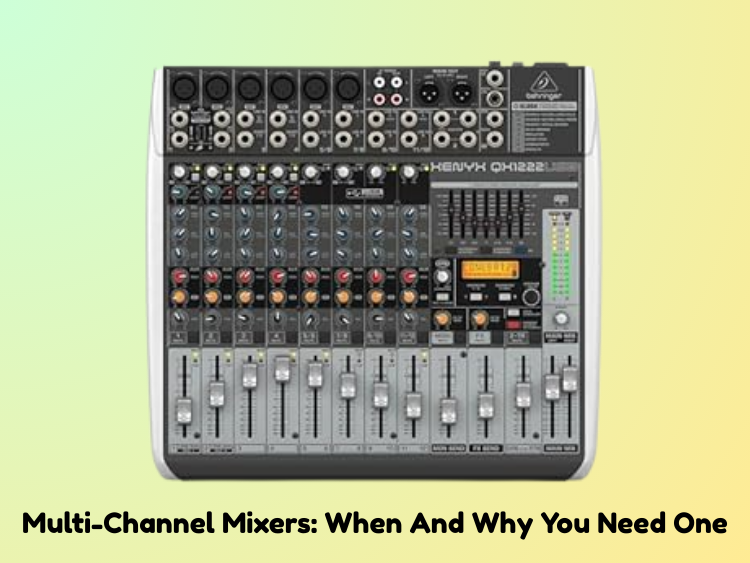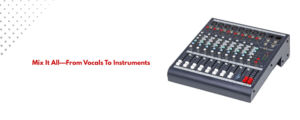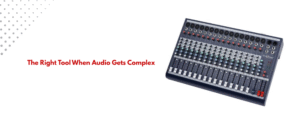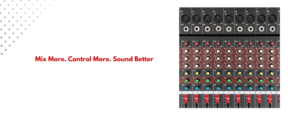If you work with sound, whether it’s live performance, recording studios, or streaming, you need a multi-channel mixer. These mixers let sound professionals and artists create balanced mixes with more flexibility by handling several audio sources simultaneously. When should one acquire a multi-channel mixer, and why would one want to do so?
What Is a Multi-Channel Mixer?
An audio mixing console, including numerous input channels, each intended to receive sound from different sources, is a multi-channel mixer. These sources could be pre-recorded audio, line-level devices, instruments, or microphones. Every channel allows for panning, equalisation (EQ), loudness, and sometimes effects. After that, the mixer combines all these signals and sends them to outputs, which can be connected to broadcasting systems, recording equipment, or speakers. To understand how these signals get routed, check out our breakdown of Main, Monitor, and FX Sends on a Mixer.
When Do You Need a Multi-Channel Mixer?
- Live Performances: You may need to handle more than one sound source at a show or play. Change the audio settings so musicians, singers, and background noise can be heard clearly. If you change the levels, EQ, and effects on a multi-channel mixer, you can balance these sound sources in real time. Without this kind of technology, managing live audio is a mess, especially when many mics and instruments are used.
- Recording Studios: Multi-channel mixers are necessary for recording engineers, especially those who work with big bands or complex sound settings. If you’re recording a full band, a show with multiple speakers, or a movie score with a large group, a multi-channel mixer lets you control each source separately to get clear and flexible results in post-production. These mixers often have subgroups and route choices that make it easier to record many audio tracks, in addition to simple mixing. Many also support subgroups and advanced routing, making them ideal for budget-conscious setups under $200 as well as professional-grade studios.
- Broadcasting: For radio, live streaming, and TV creation, it’s important to be able to control different audio sources. A multi-channel mixer ensures that the mics, sound effects, and music are balanced for broadcasts. Broadcasters need a mixer to handle multiple hosts, guests, and sound effects for a smooth production.
- Podcasting and Making Content: A multi-channel mixer may greatly improve sound clarity for podcasters and video makers. A multi-channel mixer lets you control the microphone and other sound parts for each host, guest, or audio clip. This is very important for getting a clear, professional sound. Many mixers have effects that can make your voice sound better or add dynamic noises. If you’re connecting your mixer to a computer setup, our guide on How to Connect an Audio Mixer to a PC for Recording is a helpful place to start.
- Multiple Mics Or Sound Sources: Multi-channel mixers are helpful in churches, auditoriums, and meeting halls with complex sound systems. These systems must be carefully managed to maintain sound quality and range across the room. Sound engineers can change the channels on a multi-channel mixer to fit different parts of the room or different audio needs.
Why Do You Need a Multi-Channel Mixer?
- Better Control Over Your Sound: The main benefit of multi-channel mixers is that they give you better control over your sound. A multi-channel mixer helps you improve the sound by giving you separate control over each audio source. Changing each channel’s EQ and volume and shifting makes the mix balanced and smooth, whether recording or mixing live.
- Flexibility: Multi-channel mixers can send audio data to more than one output, which isn’t possible with simpler mixers. You can send channels to the main speakers, a recording device, and a performance monitor mix all at the same time. This level of adaptability is important for both live and studio performance.
- Multitasking: You can record, mix live sounds, and make music simultaneously with a multi-channel mixer. One gadget can handle and mix sounds from different sources. This tool lets engineers and artists handle many aspects of an audio session at once.
- Professional Sound: Audio artists need a mixer with multiple tracks for professional sound. You can improve the sound quality of your mix by being able to control each audio source separately. Multi-channel mixes make you sound professional by ensuring your voice is clear in live shows and videos and matching your instruments.
- Protecting Your Setup for the Future: If you buy a multi-channel mixer, your system can grow with you, even if you’re just starting. You may not have to upgrade your mixer if it gets more inputs and outputs as your needs change. It’s a buy that can grow with your skills as a music producer.
Conclusion
Anyone doing live events, studio recording, or broadcast requires a multi-channel mixer. For professional mixes, it provides control, adaptability, and sound quality. Though their cost is higher, these mixers are essential for professional audio production because of their adaptability. Accuracy, reliability, and multi-audio input control abound from a multi-channel mixer.




